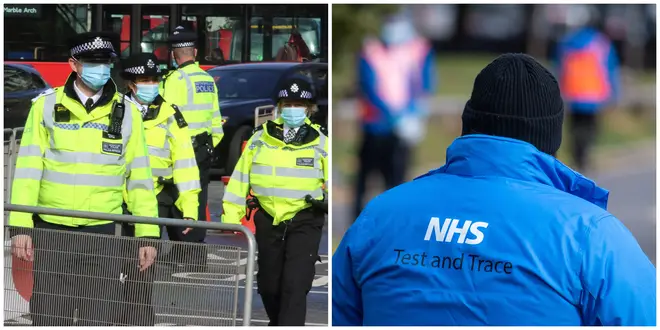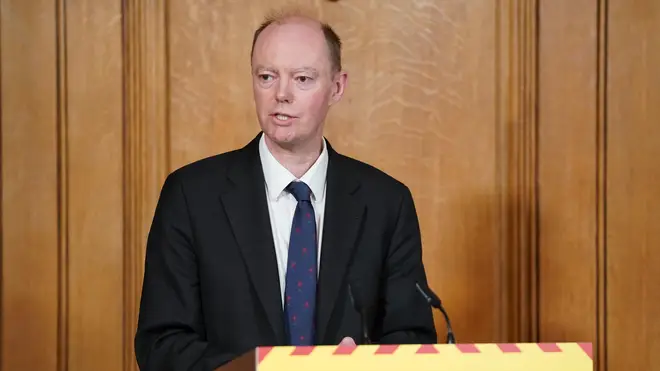
James O'Brien 10am - 1pm
17 October 2020, 22:51 | Updated: 19 October 2020, 07:34

Police forces across England have been granted access to people's data who have been told to self-isolate through the Test and Trace scheme.
The move has sparked fears it could deter people getting tested for coronavirus, something which is key in controlling the spread of the disease.
The Department of Health and Social Care (DHCS) said police forces will have access "on a case-by-case" basis to information, enabling them to know if an individual has been told to self-isolate.
The Health Service Journal (HSJ) reported that the office of England's chief medical officer, Professor Chris Whitty, was among those who feared it would put people off from being tested.
Liverpool City Region Mayor Steve Rotheram said the Government needed to "be careful about deterring people" from downloading the app.
He told LBC's Swarbrick on Sunday: “The problem is that we have to be careful about deterring people from actually taking those tests in case it is seen as being big brother.

"So I would say a note of caution to government: let’s take people with us and explain the messages so they don’t feel as if this is being done to them yet again.”
Liberal Democrat leader Sir Ed Davey said ministers should "reverse the policy urgently".
He said: "Ministers' decision to allow people's Covid test data to be shared with the police is a huge mistake.

'People might not get a Covid test over fears police could get access to their data';
Read more: Protesters march through London against Tier 2 restrictions
"Anything that further undermines the public's dwindling trust in this Government's handling of the pandemic is damaging, and few things could have been better designed to do that, than this."
Sir Ed added: "Asking our already overstretched police service to take on this task is both self-defeating and a serious misjudgment."
It comes as the DHSC updated its online guidance on Friday about how coronavirus testing data will be handled.

Health expert warns that without circuit breaker, virus will run riot
People who fail to self-isolate "without reasonable justification" could have their name, address and contact details passed on to their local authority and then to the police, the DHSC's website said.
"This may lead to enforcement action being taken against you, which could include you being fined," the online guidance said.
"A police force may request information relating to positive Covid-19 tests from the NHS Test & Trace programme directly, where they are investigating a report of someone who may not be complying with the mandatory self-isolation period."
Read more: Wales braces itself for 17-day 'circuit breaker' lockdown
Currently it is a legal requirement for those who receive a positive test result to self-isolate for 10 days after showing symptoms of Covid-19 - or for 10 days after receiving the result if they are asymptomatic.
Those in the infected person's household must self-isolate for 14 days.
Anyone who refuses to comply can be fined £1,000 for a first-time offence, but this can be raised to £10,000 for repeated breaches of the law.

Public Health England Director calls for compliance with Covid rules
In a statement, a DHSC spokesperson said: "It is a legal requirement for people who have tested positive for COVID-19 and their close contacts to self-isolate when formally notified to do so.
"The DHSC has agreed a memorandum of understanding with the NPCC to enable police forces to have access on a case-by-case basis to information that enables them to know if a specific individual has been notified to self-isolate.
"The memorandum of understanding ensures that information is shared with appropriate safeguards and in accordance with the law. No testing or health data is shared in this process."
The British Medical Association (BMA), which represents doctors in the UK, said that the test and trace system needs the "full confidence of the public" to be effective.
A BMA spokesman said: "We are already concerned that some people are deterred from being tested because they are anxious about loss of income should they need to self-isolate - and we are worried should police involvement add to this."